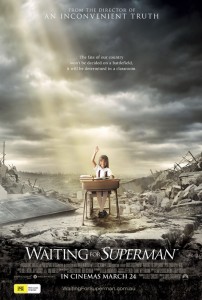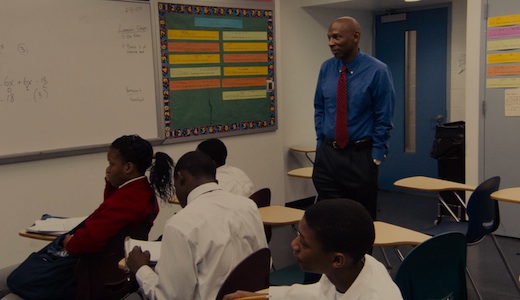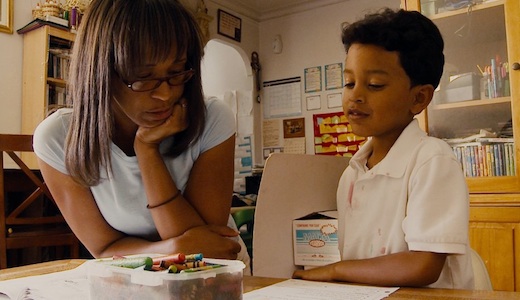It may be a self-proclaimed title, but the United States has long been touted as the leaders of the free world. Certainly as lovers of film we are keenly aware of the influence of American culture on the world. Yet in the wake of recent documentaries An Inconvenient Truth and Inside Job, it doesn’t seem as though that great power has been coupled with an equivalent responsibility. The facts about education in America are confronting. Each year, about 1.2 million students in the US fail to graduate from high school, with the US ranked 25th and 21st in maths and science among 30 developed countries. David Guggenheim, who previously explored the subject his 1999 debut The First Class, is perhaps best known for the aforementioned An Inconvenient Truth and music documentary It Might Get Loud.
The Oscar®-nominated Waiting for Superman follows five children and how their lives may be impacted by the problems of the public education system. Coming from a mixture of backgrounds, each of the children must navigate the virtual lottery of a school system that only has a limited number of resources for children and teacher who wish to excel. With input from a series of outspoken educators, Guggenheim followed the children over the course of a year to try to answer the question of who will be the hero that saves the children?
The topic of school education and the ‘future of our children’ is inevitably an emotional one, regularly capitalised upon by current affairs programs and political campaigns. The Gillard Labor government here in Australia recently copped a lot of flack about the My School website, purporting to rank the performance of almost 10,000 government and non-government schools in Australia. Guggenheim makes no attempt to remove this emotion from his argument, instead making it very personal through the accounts of five children and five outstanding or outspoken industry professionals.
It is no surprise that there is a ranking system within the US, but it is far more institutionalised than the website here in Australia. With limited resources, there are only so many places for children with excellent results to succeed in the public school system. Take for example Daisy, one of the students followed by Guggenheim and his team. A bright 5th grader, she dreams of being a doctor although her local school has a 60% failure rate for high school students. Her only chance is a place in a ‘charter school’: a school that receives public money, but is not subject to the same regulations, and by extension, the same limitations. Yet with 135 applicants and only 10 spots, Daisy only has a 14% chance of getting in through a public lottery.
Guggenheim’s solutions are often simplistic, in that there is a belief that great schools need great teachers and the environment to flourish in. Yet this is no more the solution than throwing money at the problem is. Much is said about the strength of the unions, and the inability to get ‘bad teachers’ removed from posts and reward good teachers under the current awards system. Yet in many ways this makes the film an easy target for the angry and powerful unions instead of taking a more holistic approach to the educational system. Rather, the strengths in Waiting for Superman lie in exposing a system that is fundamentally broken. While Guggenheim offers a number of solutions as to what ‘ordinary people’ can do, along with the leaders, he never fully separates himself from the more personal aspects to these stories.
Where An Inconvenient Truth relied heavily on colour charts of statistics and the persuasive Al Gore to sell its case, Waiting for Superman is all about the children and to a certain extent it exploits them. From the Michael Moore school of documentary filmmaking, the children are filmed at their most vulnerable, during the lottery style announcements of school placements. One questions if the documentary built up their expectations, and in the case of one student, their happy ending may have been as the result of the camera’s presence. What happens to these children when the documentary is over, and does this setback actually mean the end of their academic future? Yet combined with the opinions of some incredibly progressive teachers, the film points to a system that is not only flawed but forms the basis of a wider system with even deeper flaws.
The Reel Bits: If the children are our future, Waiting for Superman paints a very grim portrait of that future. Certainly a wake up call, and while it may not always provide an objective viewpoint on the situation in the US, it achieves its main aim and educates.
Waiting for Superman is released 24 March 2011 in Australia by Paramount.








